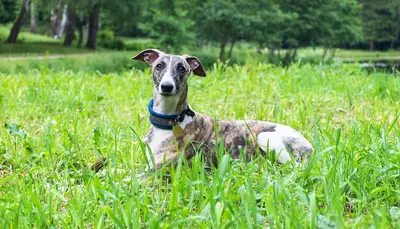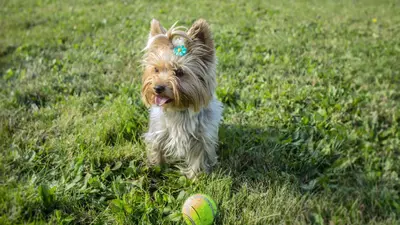Toy Poodle: Breed Guide
- 21 Dec 2019
- 5m read

When you think of a Poodle, you imagine a coat that's glamorously curled, limbs that are long and slender, plus a nose that sticks proudly up in the air. Toy Poodles have all that, too, only in a much smaller package. And how can you resist rewarding these posh pooches with tasty goodies? The thing is, treating your Toy Poodle too often can lead to extra padding that's hard on joints.
These dignified dogs enjoy both brain and behavioural training. But they weren’t made to be chunky lap dogs. They need plenty of exercise and controlled portions to keep them fit and slim.
Based on our current customers, we estimate that adult Toy Poodles need around 247 calories per day. This can vary based on your pooch’s age, weight and activity level.
How Big Do Toy Poodles Get?
According to We Love Doodles, at full maturity Toy Poodles can reach up to 10 inches at the shoulder and weigh between 4 and 10 pounds. They often reach their maximum height before they’re seven months old, but will continue to fill-out and gain weight beyond this point.
Good things come in small (tiny, in fact) packages.
What’s the Difference Between a Toy and Miniature Poodle?
The main difference between a Toy and Miniature Poodle is their size. Whilst they are both a smaller version of the standard poodle variety, Toy Poodles are much smaller than Miniature Poodles.
Miniature Poodles can measure up to 15 inches at the shoulder and weigh anywhere between 14 and 17 pounds. Of course they are still very small in the grand scheme of things, but this really highlights just how teeny weeny the Toy variety really is.
Do Toy Poodles Shed?
As a small version of the Standard Poodle, Toy Poodles have many, if not all, of the same qualities. That includes the low likelihood to shed their curly locks, which is ideal if you have an allergy to pet fur.
It’s useful to note that no dog breed is considered 100% hypoallergenic, whilst some breeds are regarded as non-shedding, they will still produce dander (dead skin cells) which can also trigger allergy symptoms.
There are a few things you can do to minimise the effects of shedding from your Toy Poodle:
• Feed your pooch a high-quality food rich in protein sources and veg
• Maintain a regular brushing schedule, every few days should do the trick
• Hoover regularly
• Train your pooch to stay off the furniture / stay out of certain rooms
• Make lint rollers your best friend - they will change your entire existence
Are Toy Poodles Good with Kids?
These adorable pooches are easy to train and exceedingly smart, making them the perfect furry family member. They’re also springy and energetic, loving to let rip and charge around. These are 10-inch-tall athletes in a curly fur suit (very little of which they shed). But, just like athletes, they need to watch what they eat.
As well as with being incredibly devoted to their pet parents, Toy Poodles are known for absolutely revelling in the limelight. Some were even circus performers, back in the day, meaning that they can provide non-stop entertainment for kids. Move over television.
How Much is a Toy Poodle?
According to UK Pets, a Toy Poodle from a Kennel club registered breeder can cost anywhere from £2,000 and £3,000.
First and foremost, you should ensure that you’re buying your pup from a reputable breeder or rescue centre. This will ensure that your dog has been bred and cared for in the right circumstances.
A sound woof of advice from us, if it seems too good to be true it’s likely that it is. A dog is a huge investment in time, money and love, so make sure that you take the time to do plenty of research before making any decisions.
As well as the cost to purchase a Toy Poodle, it is impawtent to be mindful of the other expenses involved when bringing a pooch into your life.
• Vaccines / Flea and Worming Treatments (first dosage and boosters)
• Neutering / Spaying (usually from 6 months onwards)
• Equipment (collar, harness, lead, bed, bowls, brushes, poo bags, toys)
• Food
• Insurance
• Daycare / Boarding
Butternut Box is Perfect for Toy Poodles
If you live with a Toy Poodle, you'll probably have encountered the breed's notorious fussiness at one time or another. When they decide they don't fancy something, no amount of cajoling is going to change their minds.
At Butternut Box, we've become experts in tempting picky pooches (check out what pet parents have said about our meals here). We'll ask about your pup's likes and dislikes when you sign up and only send meals that are to their (very discerning) taste.
They may like to play the clown, but Toy Poodles can be sensitive. Or at least their tums can. Your pooch might have a known intolerance or could just be prone to bouts of the runs. Either way, taking care of their digestion is best left in the hands of a tummy-friendly complete dog food that packs in all the good stuff and none of the irritants.
Our meals are made using freshly prepared veg, high-fibre lentils and are naturally hypoallergenic. We ensure every delicious meal –including our Wham Bam Lamb or Beef It Up – are made with human-quality meat too. Plus, our recipes are cooked as you would at home with everyday ingredients you could buy at your local health-food shop.
So with Butternut Box in your corner, you can stop worrying about finding the best food for Toy Poodles and focus all of your attention on your tiny pup performer instead.




